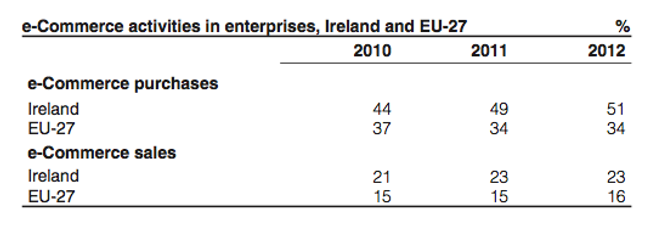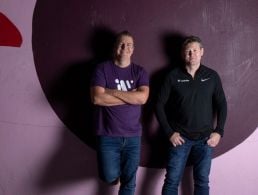At the end of December, The Digital Hub in Dublin opined that Ireland is coming of age digitally. I agree with this to an extent – Irish consumers are coming of age digitally. But Irish industries have a long and difficult road to travel and while they may buy online, how many actually sell online? Herein lies an opportunity to create jobs for graduates.
The Digital Hub, which has come under the auspices of Dublin City Council, quite rightly pointed out that digital technologies are pretty mainstream among Irish consumers (well, at least among those who can get and can afford decent broadband and who tote smartphones and other digital paraphernalia).
CEO Philip Flynn in his end-of-year statement referred to UPC/Amárach research that indicated there are 2.6m online shoppers in Ireland who are spending on average €116 per month in the digital economy.
Flynn said 78pc of companies at The Digital Hub expanded their business operations in 2012, with 44pc hiring additional staff and two-thirds planning to expand their workforces in 2013.
“Clearly, there is no recession on the internet, and the vast majority of companies at The Digital Hub are continuing to grow their business during these difficult economic times. Our experience is that companies are finding innovative ways to overcome difficulties within the Irish economy. In some cases, they are pursuing more aggressive marketing and sales strategies. For others, their growth can be attributed to moving into – or expanding their existing operations in – international markets.”
Flynn pointed out the ongoing development of The Digital Hub with the opening of new properties, as well as the filing of a planning application for an on-site ‘boutique’ data centre, as well as more programmes to support new entrepreneurs.
His instincts are correct about the emergence of a new wave of gaming businesses in Dublin and he might just be right that 2013 will be a “watershed year for digital in Ireland”. It could be a watershed for a number of reasons: Ireland’s EU presidency, the arrival of superfast and 4G broadband and the State’s decision to appoint Lord David Puttnam as the nation’s Digital Champion.
However, I felt that the use of CSO statistics released in December that showed Irish firms were above average when it came to buying online (more than 51pc use e-commerce to buy goods), the picture when it comes to selling online is less than rosy.
If policymakers in Ireland were less bovine and more brilliant they might just grasp the tantalising opportunity that lies within in terms of job creation.
The same statistics actually show that in terms of enterprises using e-commerce for sales, Ireland’s ranking has risen slightly from joint seventh place in 2010 and 2011 to sixth place in 2012. Only 23pc of Irish firms actually use the internet to sell goods.
Re-orienting Irish businesses to take part in the digital economy
Again, while Ireland might be above average for an EU country (the EU-27 average is 16pc), I can’t shake my conviction that Irish SMEs are hopelessly adrift in a world where the digital economy will be king.
Yes, we can attract in luminaries like Google, Facebook, Dropbox and Twitter to run global operations from here, but what’s actually being done to make Irish SMEs part of this thriving online economy?
I’ve pointed out more than once that the country’s slow embrace of broadband (the artery of digital commerce) has had a corresponding effect when it comes to tooling firms up for this new economy. There are firms that know they need broadband and yet can’t get it and there are firms that are too busy trying to keep their chins above water to even consider dabbling with technology to improve their lots.

Source: CSO, December 2012
What is needed is more education, training and support to make firms digitally ready, more information about how to go about it and the ability to take on the human capital in order to enact the changes necessary.
We have a situation where thousands of graduates – who are incidentally also digital natives – are emerging from our colleges and universities every year with a variety of skills only to be faced with the prospects of emigration or the dole queue if they don’t have the particular skills to work in many of the engineering roles available in FDI firms.
A scheme of some kind needs to be created that will allow these students to either keep their dole or make it financially viable for ordinary businesses that could become export companies to hire them to help transform their enterprises.
While some programmes are already powering ahead in helping to re-orient graduates towards opportunities in the technology industry, such as the Digital Skills Academy or the ISA’s recent alliance with DIT and Ericsson, something broader is required to help many more businesses and graduates excel in the digital age.
An arts graduate or business studies graduate could be given that vital first step in his or her working life if a firm could hire them to improve its e-commerce potential.
I’m not thinking of ambiguous work placements or internships but actual jobs with actual pay that help to deliver actual results and guarantee dignity and a source of pride for all concerned.
Here’s something to consider. The social network Facebook supports 4,500 jobs in Europe, 800 of which are the result of small businesses using Facebook as a platform for growth. In Ireland, Facebook supports 2,200 jobs, out of which 450 people are employed directly by the company.
Route to digital economy via intersection of arts and science
To many pragmatically minded souls, hiring an arts graduate to help a furniture store, restaurant or jeweler embrace digital doesn’t actually make sense.
Here’s why I disagree.
As the late Apple CEO Steve Jobs (himself a dropout from an arts college where his favourite subject was calligraphy) pointed out, the real opportunities in technology occur where the worlds of creativity, art and technology intersect.
It is worth pointing out that the outgoing CEO of Intel Paul Otellini’s primary degree is in economics, the head of Google in Ireland John Herlihy is an accountant by training and the head of Facebook in Ireland Sonia Anne Flynn has a master’s degree in German literature.
A graduate of history, law or business today is also an individual who for as long as they can remember has always had the internet and has no fear of technology.
What they do fear is unemployment. What they need most is encouragement.
The same fears and desires play on the mind of ordinary business owners in Ireland today.
I see an opportunity to hit two birds with one stone. Give firms the chance to go digital and give graduates that vital career push.
Create a mechanism that will get people into employment and help firms become more relevant and profitable. That is all.
Navigating digital image via Shutterstock




